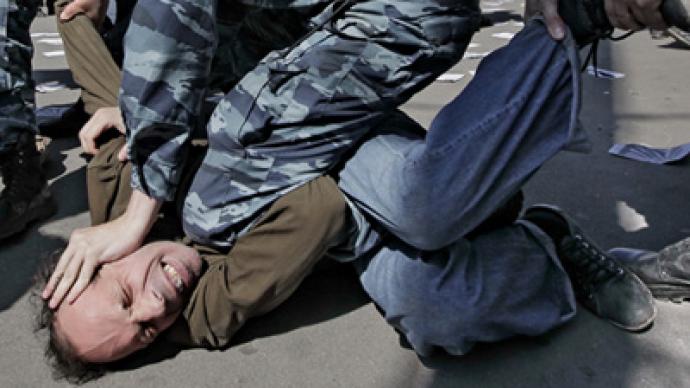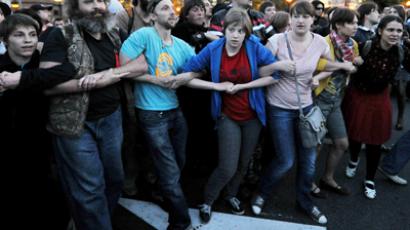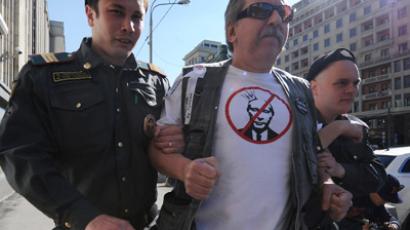150-fold illegal protest fee hike backed by Russian lawmakers

The Russian lower house has supported toughening the punishment for illegal protests despite opposition attempts to hold proceedings after 11 hours of a marathon session.
The law was passed in the third, and final, reading with 241 votes for and 147 against, reports RIA Novosti news agency.“We could see today that nothing’s sacred for them,” said Sergey Mironov, the leader of Fair Russia. “We will appeal to the Constitutional Court. The battle is only beginning. I am convinced that this law can be reversed as any other measure.”The new law raises the maximum fine for illegal street protest to 300,000 roubles (roughly $9,000) from the current 2,000 roubles (under $70), introduces the option of compulsory community service of up to 200 hours and makes other changes aimed to make the life of illegal protesters more difficult .However, the parliamentary opposition claims the majority faction United Russia simply got scared by the protests after the recent elections and sought to strangle the protest movement by intimidation. To prevent this, the leftist faction Fair Russia suggested a move that they called “Italian Strike” – Fair Russia deputies submitted over 400 amendments to the bill and insisted the Lower House voted separately for each. Fair Russia did not disguise the fact that they hoped to buy some time for those who planned more protests on Russia Day on June 12. The reaction from the supporters of the bill was fast and straightforward. “That’s simply like doing what soldiers do in barracks after the lights are out if they have not seen women for a long time,” parliamentarian Aleksey Mitrofanov described Fair Russia’s attempts to delay the passing of the bill.The ruling party then replied by passing a regulation that allowed voting for a block of amendments at once and summarily rejected all the amendments that included some curious suggestions like rallies should only be held when the outside temperature is between 10 and 30 degrees above freezing. Now the bill must be approved by the upper house and signed by the President. When it is done, the maximum penalty for illegal protests will be 300,000 roubles ($9,000) for individuals and 600,000 roubles ($18,000) for officials and legal entities.The Lower House also adopted an amendment providing for the creation in each region an area of open places for public debate and protest similar to London’s Hyde Park. Pickets in such areas will not require any permission from the authorities. Another amendment stipulates that demonstrators are not allowed to wear masks or carry any weapons or objects that could be used as weapons. Bringing spirits and flammable products to the rally area is also forbidden. The draft law was initiated by the United Russia faction. It was submitted after opposition rallies in Moscow on May 6, which got out of control with several dozen people injured, both among protesters and riot police. Originally, United Russia suggested raising the maximum fines for violations during street protests to 1.5 million roubles ($50,000), but agreed to drop it after the first reading.The bill has caused a lot of controversy and debate. Non-parliamentary opposition has staged a series of rallies in protest the new legislation.The presidential council for Human Rights has sent a special letter to the Lower House speaker asking to return the bill to the first reading due to “internal contradictions”. The HR activists claimed that raising the fines was against the Constitution and a number of laws as well as against the criminal and labor codes. The Council also sent a letter to the head of the State Duma Constitutional Committee claiming that even if the bill is approved it would only cause the protests to become more radical. Commenting on these letters, the head of the United Russia faction Andrey Vorobyov said that the bill had been studied and approved by the State Duma legislative committee and experts found no contradictions in it. The parliamentarian added that the bill would make protests more civilized and thus it should not be returned to the first reading.














